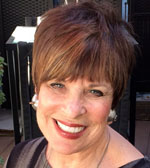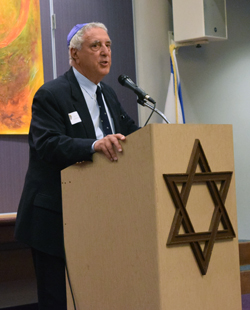By Judy Friedel


SAN DIEGO — San Diego Jewish World editor and publisher Donald H. Harrison (H. stands for Henry), was born in New Rochelle, New York on August 7, 1945, the day between the atomic bombings of Hiroshima and Nagasaki. His mother would say that Don’s arrival was the explosion in between. For Don, a future journalist and lover of history, this certainly marked an auspicious beginning.
Don’s parents were Marty and Alice. Dad was in the schmatah biz. He worked as a sales rep for his uncle’s company that converted cotton and rayon into pocket linings for men’s suits. His job required frequent cross-country travels. Don’s mother was a stay-at-home mom and a dedicated Community Chest volunteer. She was a long-term breast cancer survivor, who, after her move to San Diego following the 1975 death of Don’s father, visited post-surgery mastectomy patients at University Hospital, counseling them on their options concerning prosthetics and compassionately aiding in their physical and mental recovery.
By the time Don’s mother settled in San Diego, her son, who arrived in 1972, was well on his way to building a career in national, state, and local journalistic and political circles.
Don graduated from UCLA in 1966 with a B.A. degree in political science. In college, he began his path to journalism by serving as managing editor of the Daily Bruin and an intern with the Los Angeles Times. In 1967, he managed to squeeze in 80 days in the Army, a stint that ended with a torn cartilage in his knee and a medical discharge.
But he was not all work/no play/no way, and at a vacation dance sponsored by an organization called “SinGrads” (standing for single graduate students), Don met a young UCSB student named Nancy Zeiden. As Don explained, to be a member of SinGrads, only the guys needed to be graduate students, which, at the time he was at UCLA. He was stationed at the entrance to stamp the hands of those old enough to drink. Nancy didn’t make the cut, but she kept circling back to ask for the stamp. It finally dawned on Don that maybe he was what interested her (and that he was probably the only Jewish guy in the place, which also appealed to her). He told her he couldn’t stamp her hand, but he could dance with her. They married in February 1968.
The next several years were hectic ones, as Don worked as reporter and editor for the Associated Press in the New York, Los Angeles, and Sacramento bureaus; and political writer for the San Diego Union covering and traveling in 1972 with both the Nixon and McGovern presidential campaigns. During this time, his and Nancy’s daughter Sandi was born in 1972. David followed in 1975.
After 8 years with the Union, a change in management at the paper left Don with the sinking feeling that his career had reached an impasse. He shifted from newspaper man to PR man and became partner in the firm Harrison & Cella with L.J. Cella. For the next two years, between 1980 and 82, he handled political campaigns and corporate accounts. Cella wanted to expand the firm. Don was reluctant but he didn’t want to rain on Cella’s parade. He allowed Cella to buy him out, but then there was that old sinking feeling again: now what? So the family bought an RV and took off for a summer of seeing the USA, traveling 10,500 miles, covering 40 states. Upon their return, Don received a call from the Los Angeles Herald Examiner to cover the gubernatorial election campaign of LA Mayor Tom Bradley vs. George Deukmejian. At the same time, San Diego Mayor Pete Wilson was running for US Senate against Jerry Brown. When Wilson won, San Diego Deputy Mayor Bill Cleator moved into the position of acting mayor. He asked Don to serve as his press secretary, an invitation that stumped Don. Don at the time was a Democrat (now he’s an independent) and Bill a Republican. “He’ll never take my advice, “ thought Don, and he never did. But what happened during Don’s time with Cleator – directly and indirectly — brought exciting changes to Don’s life and career.
First up was the historic San Diego visit in 1983 of Queen Elizabeth II. Don was to handle the national and international journalists – 700 strong — who descended upon San Diego. Don created the voluminous press packets that included well-researched information about all the places the Queen was to visit. Don also got to handle the huge international story shot all around the world that Acting Mayor Bill Cleator had touched the Queen! Another story picked up by several outlets was of Don’s own making. During an informal press gathering on the queen’s yacht Brittania, he asked the queen if she knew about the book The Prince and the Pauper by Mark Twain where the prince exchanges places with a poor look-alike commoner. “Oh,” replied the queen. I think I once saw it on the telly.” “So,” asked Don, would the Queen ever want to do something like that to see how her subjects live? After a deer-in-the-headlights look appeared on her face, she replied, “Oh no! I quite enjoy being the queen!”
Don’s tenure with Cleator also paved the way for Don’s future involvement with key aspects of San Diego tourism. Cleator’s interest in establishing a cruise ship consortium, which he funded out of his own pocket after he left the mayor’s office and resumed being a city councilman, eventually positioned Don to serve as the executive director of San Diego Cruise Industry Consortium from 1983 to 1991. A cruise industry meeting in Miami provided an introduction to Key West-based company that operated Old own Trolley Tours in several cities, a perfect fit for San Diego thought Don. He soon became a founder and start-up general manager of Old Town Trolley Tours of San Diego, all the while maintaining his PR business. The company’s concept for these tours extended beyond hop on, hop off convenience. Drawing from his research of San Diego history and sites for the Queen’s visit, Don prepared scripts to educate and entertain the trolley tourists.
Enter Don’s fascination with Louis Rose, San Diego’s first Jewish settler, and with San Diego’s Jewish history in general. His book, Louis Rose: San Diego’s First Jewish Settler and Entrepreneur, was published in 2005. He later took his interest in Jewish history on the road with a travel book, Schlepping Through the American West: There’s a Jewish Story Everywhere, published in 2014.
Don’s own Jewish history was minimal during his early years. His father, in particular, had an antipathy toward religion. Don’s awakening happened during his daughter’s bat mitzvah as he passed the Torah and realized that she had much more knowledge of Judaism than he did. “I was learning Judaism from my daughter,” he says. He and Nancy went on to have adult b’nai mitzvahs at Tifereth Israel. While at Tifereth, he covered a presentation by rabbis of the three main Jewish movements, prompting requests from both Jewish newspapers existing at the time to write for them exclusively. “The weekly San Diego Jewish Press Heritage” — which Don viewed as “more committed to the Jewish people” — was more appealing to him. He eventually became its editor and publisher.
Throughout the years from 1983 until today, Don has been the sole proprietor of The Harrison Enterprises that specializes in journalism, public relations and tourism. Add in the San Diego Jewish World on line and you have a spectrum of Don’s professional and religious passions. His personal passions for his wife, two children, and four grandchildren complete a portrait of a well-lived life that continues on the promising path that began on a day of historic precedence.
*
Friedel is a freelance writer, San Diego Jewish Film Festival volunteer, and active member of Tifereth Israel Synagogue. Comments intended for publication in the space below must be accompanied by the letter writer’s first and last name and by his/ her city and state of residence (city and country for those outide the U.S.)